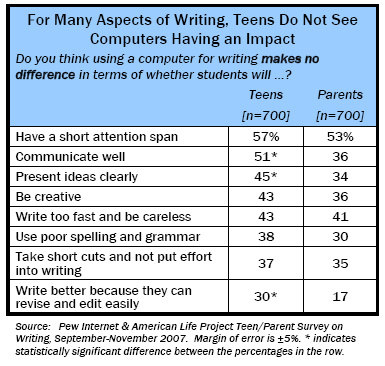Introduction
Much of the research on the topic of youth and writing addresses questions of instructional quality and effectiveness from the perspective of administrators, teachers and parents. As noted earlier, this study deliberately focuses on this issue from the perspective of teens themselves in an effort to inform this body of research. To further this objective, we asked teens to share their thoughts on the importance of writing to their future success, as well as their perceptions of the efficacy of current educational strategies. We also asked them to tell us about the distinctions they make between school and non-school writing and the relationship of these two writing styles to their use of technology. We found that teens strongly see the value of writing for their future and credit school, primarily, as the place that will provide the most instructional guidance for development.
Teens feel writing is key for their future success.
Teens understand that their ability to write effectively will have an impact on their future prospects, as fully 98% agree that writing is at least somewhat important for their future success. Of these, more than half (56%) think that writing is “essential,” 30% think that it is “important, but not essential” and 12% see it as “somewhat important.” Just 2% feel that writing is “not at all important” to their future success in life.
Most of the variation in how teens view the importance of writing centers on parent education and household income. Six in ten teens (60%) whose parents have some college education view writing as essential to success in life, compared with five in ten teens (51%) whose parents have no college experience. Similarly, 60% of teens from households earning $50,000 or more per year say that writing is essential, compared with 49% of teens from lower-income households.
Our focus group comments indicate that many teens view good writing skills as vital when seeking employment, while others view writing as just one part (albeit an important one) of a series of skills that, when done well, improve one’s overall chances of success. Finally, a smaller subset of teens believe that while good writing skills are useful, that the quality of one’s writing should not detract from the quality of one’s ideas.
‘Cause like if you want to go and get a job and people see like you can’t write or you can’t like read stuff then they won’t hire you. You have to have good writing skills to get a good job.
– 9/11th Grade Girl, Southwestern City.
Yeah, you need to write. You need to be able to write, but it’s not a guarantee you will do well. Writing well is a part of doing well.
– 11/12th Grade Boy, Northeastern City.
I don’t think [writing] reflects a person and how they think because my mom is from Israel and she writes English and her handwriting isn’t the best and she isn’t always grammatically correct, but she is very smart. So I don’t think it reflects.
– 11/12th Grade Girl, Pacific Northwest City.
Most teens feel that their writing has improved over the past year.
When asked to evaluate the progression of their own writing abilities over the past year, three-quarters of teens (77%) think that their writing skills have improved. One in five (22%) see little or no change, and just 2% feel that their writing skills have actually declined. This belief shows little demographic or socio-economic variation. The only notable difference pertains to gender—26% of boys say there has been little or no change in their writing over the past year, compared with 17% of girls.
Of these teens whose writing skills have changed for better or worse over the past year, more than half (53%) feel that the writing instruction they receive in school is a major factor driving that change. A somewhat smaller number (39%) cite the technology tools they have used for writing as a major factor, and just one in four teens cite their personal (non-school) writing as a major factor behind their writing improvement. These rates are consistent across all major demographic and socio-economic groups.
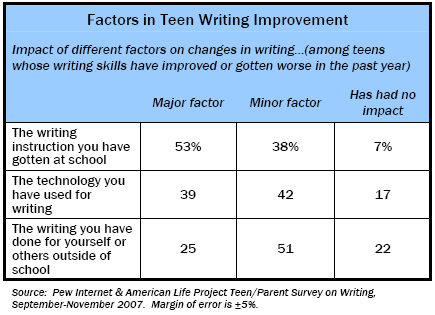
Many of the teens in our focus groups pointed specifically to the influence of demanding teachers as a major factor in helping them to improve their writing skills.
My history teacher this year really helped me with my writing because it was a college history class so it was the first time I had to sit down and write a 25 page paper. It was worth a third of my grade. She really helped me because it was really difficult.
– 11/12th Grade Girl, Pacific Northwest City
My English teacher in my sophomore year…went through how to construct essays and looked for more insight into literature and also she was a hard grader so that also pushed me to work harder.
– 11/12th Grade Girl, Pacific Northwest City
[My English teacher] didn’t exactly teach us how to write essays but if I gave him a paper like a draft he would cross it out and tell me how to make it better. He was a real hard grader—so in that sense it made me hate him —but looking back it was really helpful. He taught me to look into why and how.
– 11/12th Grade Girl, Pacific Northwest City
Most teens feel their personal electronic communications have little impact on their overall writing skills.
Teens generally feel that the personal electronic communications they have with their friends have a negligible impact on their overall writing abilities. Among teens who send text messages, email, instant messages or post on social networking sites, 73% say this communication has had no impact (either positive or negative) on the writing they do for school and 77% say that it makes no difference to the quality of the writing they do for personal reasons. Fifteen percent of teens say that communicating electronically has helped improve their school writing and 17% say it has improved their non-school writing, while 11% say it has harmed their school writing and an even smaller number (6%) say it has had a negative impact on the writing they do outside of school.
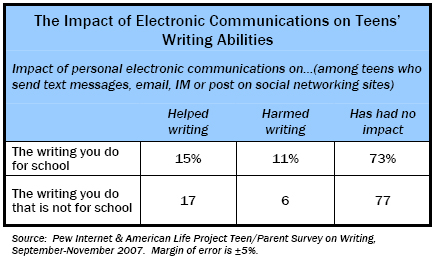
Boys in particular have relatively positive attitudes about the impact of their personal electronic communications on their overall writing skills. One in five boys (20%) feel that these interactions have helped the writing they do for school, compared with just one in ten girls (10%). Lower-income teens also feel that their electronic communications have a salutary effect: one quarter of teens in households earning less than $30,000 per year say that these interactions have helped the writing they do for school, while just 12% of teens living in households earning $75,000 or more per year say the same.
In our focus groups, teens distinguished between “formal” and “informal” writing using criteria such as audience, writing genre, media/technology and intent.
Formal writing you have to be a little more proper, use certain themes like literary devices or you know, and informal you just write whatever, you don’t really think about ‘oh, I have to write like this. . . . I’m just going to tell this person this so write that.’ But formal you have to put it all together.
– 9/11th Grade Boy, Southwestern City.
You have to write to the audience. Like your friends you can talk to like abbreviations and stuff, but if you are writing to a teacher, you want to make sure you’d be formal so that way they will grade your work better.
– 11/12th Grade Boy, Northeastern City.
I mean when you’re writing in front of your friends you write the way you would talk to your friends. When you’re writing to your teacher it’s more professional and you try harder.
– 9/10th Grade Girl, Midwestern City.
Teens also felt the limitations and constraints of formal writing, but understood that formal writing may not be always be the most enjoyable thing to execute. Still, they said they thought that learning how to write formally would pay dividends later in college and in the workplace.
I think you are expressing yourself less with formal [writing] . . . because you are trying to put the words that people want to see. If you are writing a paper you might feel one way but you are like ‘I know my teacher would want me to write this,’ so it’s not really your thoughts. It is in your words but it is what your teacher would want to hear as opposed to what you really think. – 10/12th Grade Girl, Southwestern City.
Teen 1: [Formal writing is] not bad, it’s just not fun.
Teen 2: It’s good for you, but you don’t want to do it.
Teen 3: It’s like eating vegetables.
– Exchange in 9/11th Grade Group, Southwestern City.
Well I think going through high school you need to do everything formally in the way teachers want so that when you get to college and you’re actually learning to do or to be what you need to be when you grow up. You can pretty much do informal because it’s what your thoughts are for your future. But you need to learn like the basics – just structure – at some point.
– 9/11th Grade Girl, Southwestern City.
Teen 1: I don’t think [formal and informal writing]
are that different because you could write
something informally and then make it formal.
Teen 2: Informal is like the warm up and then
formal is like the race.
Teen 3: Like the rough draft.
– Exchange in 9-11th Grade Group, Southwestern City.
Some teens also indicated that the compressed nature of instant messages and texts contribute almost unconsciously to a less formal and more conversational feel in the writing. They also identified areas where the influence of text messaging was, from their perspective, a negative influence on the complexity of their writing.
If it is with texting, IMing, or MySpace it is usually always casual writing. In emails, even to my friends, I find myself doing a little more formal. And just because I think it has to do with the length, since it is longer and also I’m doing it with Microsoft Word and doing a document.
– 11/12th Grade Girl, Pacific Northwest City.
I would say it definitely cripples your vocabulary if all you are using is the same couple of hundred words that are abbreviated. If you are only seeing the same things in different combinations from people, then you aren’t going to expand. I guess your mind can only get so small. If the extent of your reading is only the text messages and emails from your friends, then, yea, definitely, it isn’t going to help you that much as opposed to a book.
– 9/10th Grade Boy, Pacific Northwest City.
I text sometimes but not a lot. It’s not like it affects me. But I realize that, like my friend Ally, she texts a lot – a lot. Like when she wants to say something to her friends she cannot like, she’ll just sit there and text and like when she writes a report you’ll see it in her report. And then like when she goes to print off, she’ll be like ‘dang, I used that instead of that.’ She’ll have to go and rewrite her report and sometimes she’ll ask me to type her report for her. And I’ll be like ‘no, I can’t type your report.’
– 9/10th Grade Girl, Midwestern City.
Some teens noted the benefits of learning a quick shorthand for taking notes in school . . .
I think [instant and text messaging abbreviating] helps sometimes because like when we’re taking notes we have to hurry up and take them and knowing the text language it helps to abbreviate. . . . faster.
– 9/10th Grade Girl, Midwestern City.
. . . while others rejected abbreviations or shortened word forms of any kind.
Well I’m a complete grammar freak and I have to spell everything right and it annoys the crap out of me when people use like abbreviations and everything. I just like twitch because it annoys me. And I always correct people on their spelling.
– 9/10th Grade Girl, Midwestern City.
Mostly, if I text message, I usually use proper grammar and pronunciation and punctuation. I know a lot of my friends don’t do that, but I am kind of funny about that. I don’t like using abbreviations or things like that because it is just not the way I am.
– 11/12th Grade Boy, Northeastern City.
Teens feel that additional in-class writing time and computer-based writing instruction would each improve their overall writing skills.
Most teens feel that additional instruction and focus on writing in school would help improve their writing even further. Our survey asked teens whether their writing skills would be improved by two potential changes to their school curricula: teachers having them spend more time writing in class, and teachers using more computer-based tools (such as games, writing help programs or websites, or multimedia) to teach writing.
While the options presented in our survey were quite different in nature, teens find the approaches equally appealing. Overall, 82% of teens feel that additional in-class writing time would improve their writing abilities, similar to the 78% who feel the same way about computer-based writing tools. For each option, roughly three in ten teens say that option would improve their writing “a great deal,” and four in ten say it would help improve it “somewhat.”
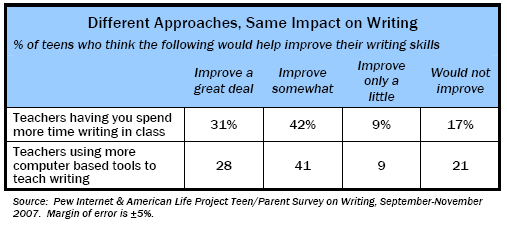
A deeper analysis of this issue provides an interesting commentary on the needs and desires of different groups of teens with respect to writing improvement. For instance, black and Hispanic teens feel more strongly than whites about the need for additional in-class writing time: nearly half of black teens (48%) and four in ten Hispanic teens (38%) feel that increased in-class writing time would improve their writing “a great deal,” significantly higher than the comparable figure for whites (25%). However, there are no significant racial or ethnic differences on the impact of computer-based writing tools.
Girls and boys are equally positive about the potential impact of increased writing time in class, with eight in ten girls (84%) and boys (80%) indicating that this would help improve their writing at least at little bit. However, boys are less enthusiastic about the potential benefits of computer-based writing instruction. Fully 25% of boys feel that computer-based writing tools would not help improve their writing abilities, compared with just 16% of girls who feel the same.
Teens from lower-income households and children of lower-education parents respond particularly favorably to both writing improvement concepts.
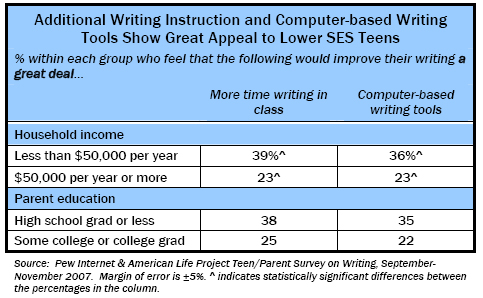
Focus group participants talked about the impact of teachers on their learning, and the importance of technology for their future.
I think the only thing that really changes if I am bored at school is a teacher. If the teacher is really good then I will be interested. The technology isn’t affecting it.
– 9/10th Grade Boy, Pacific Northwest City.
I don’t think it is the downfall to civilization but I think a lot more of this technology will be used for future jobs. I think they will start using a lot of the technology that we use today for future jobs. I can see that happening. Our generation has more knowledge of technology, more than adults can say. We caught onto it more effectively.
– 9/10th Grade Boy, Pacific Northwest City.
Teens have a nuanced view of the relationship between writing on a computer and writing outcomes.
As was seen with parents, teens do not view computers as a consistently positive or negative force in their writing development: they see some clear benefits to using a computer for writing but also recognize that computers can encourage some negative writing habits as well.
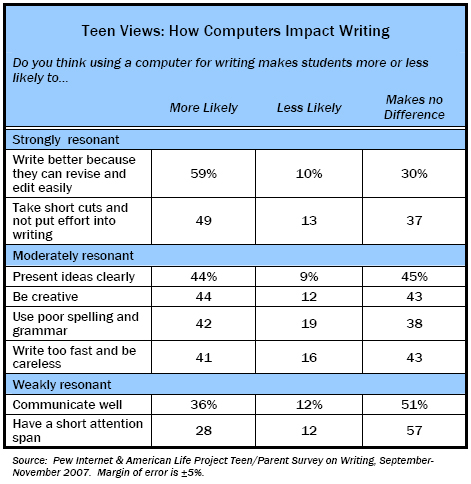
This nuanced attitude is clear in the two impacts that resonate most strongly with teens. While six in ten teens (59%) feel that computers help students write better because they can revise and edit easily, half (49%) believe that computers cause students to take short cuts and not put sufficient effort into their writing.
In the same vein, two positive and two negative impacts resonate moderately with teens. Roughly four in ten teens feel that using a computer for writing makes students more likely to present ideas clearly (44%) and be creative (44%), yet a similar number feel that computers make students more likely to use poor spelling and grammar (42%) as well as write too fast and be careless (41%).
Much like their parents, teens view “having a short attention span” as the least likely impact of computer-based writing. Just 28% of teens (and 22% of parents) feel that writing on a computer makes them more likely to have a short attention span.
Teens in our focus groups elaborated on why they use technology to write and what they or others in their lives think the impact of that choice is:
I usually type because I do have messy handwriting. So I like typing and I find it easier to collect my thoughts, I don’t have to worry about the spelling and I can worry about the creativity of the story rather than if I spelled it right.
– 7/8th Grade Boy, Midwestern City.
My tech teacher encourages us [to type our papers], but our English teacher discourages us because we get lazy.
– 9/10th Grade Boy, Pacific Northwest City.
[If I didn’t type, my papers would be] . . . less clean, but [the] thoughts expressed would be just as successful.
– 11/12th Grade Girl, Pacific Northwest City.
Teens place less emphasis on the role of computers in their writing than parents do.
Relative to their parents, teens tend to downplay the overall impact of computers on their writing. Teens are significantly more likely than their parents to say that computers make no difference to three of the impacts evaluated in this study: “communicate well,” “presenting ideas clearly” and “write better because you can revise and edit easily.”
